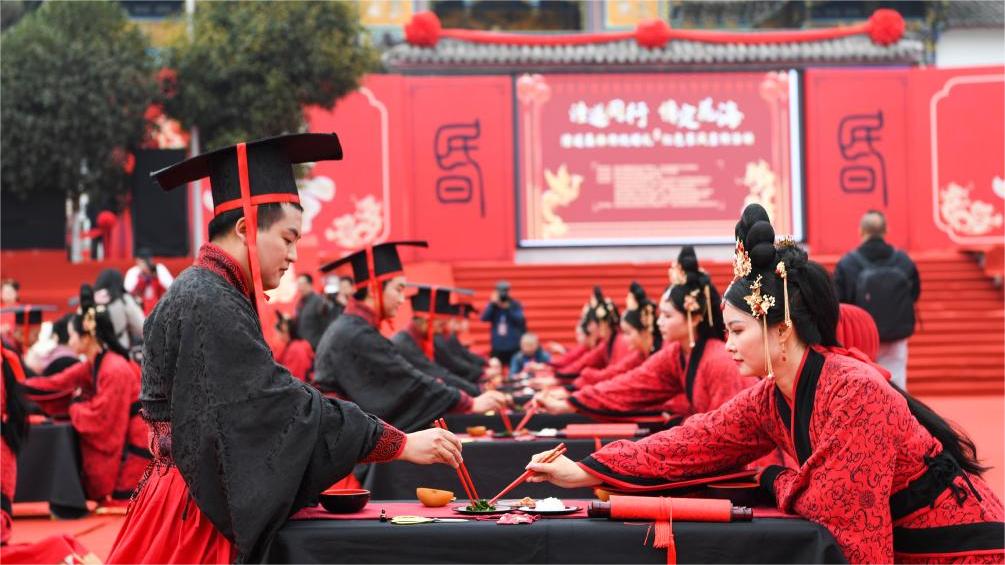Commentary: "China card" no cure for America's ills
BEIJING, March 13 (Xinhua) -- Despite U.S. President Joe Biden's brief remarks on China in his State of the Union address, the underlying tone of confrontation remains unmistakable.
Alleging that he wants "competition with China, but not conflict," Biden described the United States as "in a stronger position" to win the competition of the 21st century against China or anyone else.
This rhetoric, in effect, echoes the blunt assertion of U.S. Secretary of State Antony Blinken that "if you're not at the table in the international system, you're going to be on the menu." It also smells of the mentality behind U.S. Ambassador to China Nicholas Burns' undiplomatic declaration that "we don't want to live in a world where the Chinese are the dominant country."
Such unsubtle statements from prominent U.S. politicians betray a deeply ingrained sense of superiority and a constant dread of losing global hegemony, which are reinforced by Washington's obsession with branding China as a "long-term strategic competitor" to be contained.
Washington's ploys to contain China have been coming thick and fast. Under the pretext of national security, it has removed Chinese battery giant CATL from a Marine Corps base, announced plans to invest billions to replace China-made "spy cranes" in U.S. ports, put more than 1,000 Chinese companies on various sanctions lists, and imposed export controls over advanced technologies such as biotech and AI, to name just a few.
Yet U.S. politicians need to understand that playing the "China card" can never shake off America's internal woes. Its domestic challenges, including partisan strife, political polarization, populism, racism, soaring national debt and gun violence, come from within, not from China, and can only be tackled that way.
As Ryan Hass, a senior fellow at the Brookings Institution, has wrote, "Any effort to lean on the external threat of China as a basis for overcoming domestic divisions at home is unlikely to succeed and likely to harm U.S. interests at home and abroad."
Casting China as an "imaginary enemy" carries the peril of escalating tension and increases the risk of conflict with China. It also undermines efforts towards constructive engagement and mutual understanding, and erodes the trust needed to foster a healthy and stable relationship between the two major countries.
China's strategic aims are transparent and unambiguous. It has no intention of supplanting the United States, and is committed to making steady progress in its socioeconomic development and thereby meeting its people's expectation for a better life.
Meanwhile, China aims to provide more public goods for the world and promote peace and development without imposing its will on others. This approach, emphasizing cooperation and mutual benefit over unilateral dominance, stands in stark contrast to U.S. hegemonic bullying.
In the face of global uncertainties, the United States and China have taken different approaches. America has taken a self-serving posture, attempting to limit and even stifle the growth of other countries. China, by contrast, has chosen to promote its own development while supporting the creation of a global community that prioritizes mutual benefit and cooperation and builds a shared future for all people.
Ultimately, the divergent paths represent a critical choice the world has to make: whether to prioritize unilateralism under the guise of competition or embrace mutual cooperation and collective prosperity.
The better way ahead is no less plain than Washington's hegemonic anxiety.
Photos
Related Stories
- U.S. fund manager buys up Chinese debt
- China encourages peoples of China, U.S. to make more exchanges: FM spokesperson
- China-US relations key to world stability, envoy says
- China's Shandong unveils cultural treasures, natural landscapes in U.S. San Francisco
- China urges U.S. to stop harassing Chinese students under pretext of national security
Copyright © 2024 People's Daily Online. All Rights Reserved.









